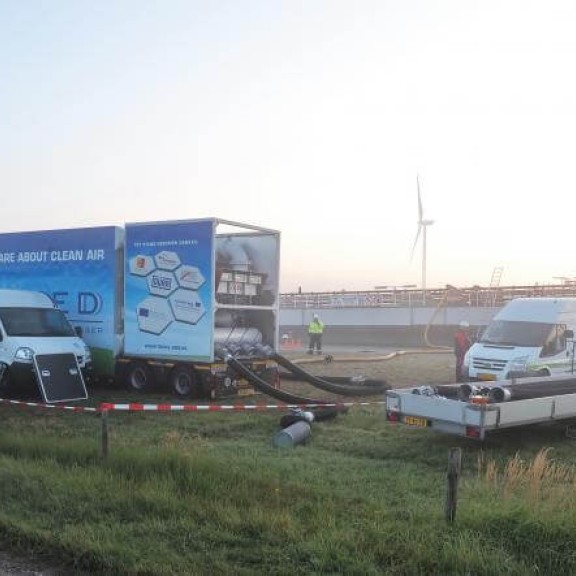
First degassing tests for barges underway in Port of Amsterdam
A trial involving innovative vapour recovery systems was launched in the port of Amsterdam today. The aim is to enable barges to recover vapours safely and in a controlled manner to prevent them from being released into the air. This marks a significant step towards clean shipping.
Testing by two companies
The North Sea Canal Area Environment Agency has given two providers, Triple D and 24/7 Nature Power, the green light to test their vapour recovery systems at the ‘Groene Kade’ (‘Green Quay’) in the port of Amsterdam in the week of 21 September. Both companies use a vapour recovery plant based on the mobile condensation principle (24/7 Nature Power) and for the combustion of the vapours (Triple D).
Port of Amsterdam has been working for many years on creating the conditions for safe degassing in the port. It is providing access to the public ‘Groene Kade’ for the tests as part of its efforts to make the port sustainable.
The Environment Agency, too, has been working on preventing illegal degassing for some time. Sensory systems known as ‘eNoses’ are being used as watchdogs to prevent illegal degassing, for example. This test represents an important next step.
Permit if successful
The tests involve establishing how the equipment is performing in terms of reducing the emissions of benzene and residual vapours containing benzene.
This determines whether the plant in question is meeting the set requirements. If the trials are successful, the providers will be able to apply to the North Sea Canal Area Environment Agency for a permit.
Independent measurements
The North Sea Canal Area Environment Agency has commissioned an independent agency to conduct the test measurements that can be used to establish whether the plants meet the strictest requirements or require further improvement.
Prohibition on degassing during passage
Air quality is adversely affected by vessels degassing during passage in the inland navigation routes. This affects the health of local residents and the people working with these substances. On 1 March 2017 the Province of Noord-Holland banned the practice of degassing benzene and substances containing benzene as a measure to improve the environment and clean up inland navigation.
The industry has already succeeded in achieving a significant reduction in emissions in recent years, but this has not yet led to degassing being entirely ruled out. For that reason, the prohibitions are being extended in phases during 2020 into a national ban that will reduce the emission of these harmful substances by 98%.
National Taskforce on Degassing During Passage
The results of the trials are being evaluated in the ‘Taskforce on Degassing During Passage.’ Cora van Nieuwenhuizen, Minister of Infrastructure and Water Management, set up this taskforce in 2018 to ensure the smooth introduction of the national ban.
The taskforce includes representatives of the central government, provincial authorities, ports, shipping companies, carriers, warehousing companies and vapour recovery providers.
In introducing the national ban, it is important that an infrastructure is put in place that features plants that are able to process or recycle the residual cargo vapours.